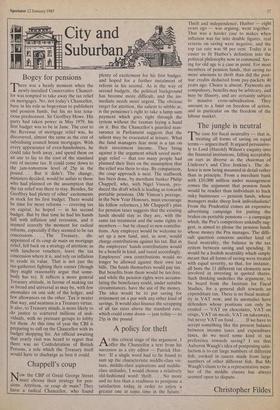City and Suburban
Bogey for pensions
There was a heady moment when the 1 newly-installed Conservative Chancel- lor was tempted to take away the tax relief on mortgages. No, not today's Chancellor, busy in his role as bogeyman to publishers and pension funds, but his no less tena- cious predecessor, Sir Geoffrey Howe. His party had taken power in May 1979, his first budget was to be in June. The cost to the Revenue of mortgage relief was, he discovered, almost the same as the cost of subsidising council house mortgages. With every appearance of even-handedness, he could take both away, and spend them on an axe to lay to the root of the standard rate of income tax. It could come down to the jam-tomorrow level of 25p in the pound. . . . But it didn't. The change, ministers decided, would be unfair to those who had planned on the assumption that the tax relief was there to stay. Besides, Sir Geoffrey had plenty of other' excitements in stock for his first budget. There would be time for more reforms — covering tax on capital, he hoped — in his second budget. But by that time he had his hands full with inflation and recession, and it seemed scarcely the moment for radical reforms, especially if they seemed to be tax concessions. . . . The Treasury, dis- appointed of its coup de main on mortgage relief, fell back on a strategy of attrition: as with luncheon vouchers, leave the tax concession where it is, and rely on inflation to erode its value. That is not just the tax-gatherers fighting their corner (though they might reasonably argue that some- body has to). It reflects a more general Treasury attitude, in favour of making tax as broad and universal as may be, with few anomalies on one side of the ledger, and few allowances on the other. Tax is neater that way, and neatness is a Treasury virtue. It also, to Treasury minds, is more likely to do justice to scattered millions of indi- viduals, with no pressure groups to lobby for them. At this time of year the CBI is preparing to call on the Chancellor with its budget shopping list. An official awaiting that yearly visit was heard to regret that there was no Confederation of British Persons, a role which the Treasury itself would have to discharge as best it could.






































 Previous page
Previous page